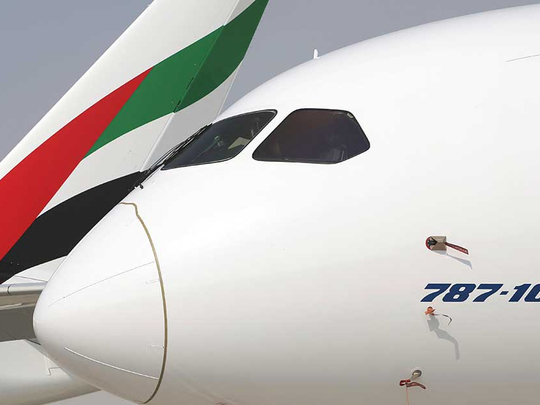
DUBAI: Driverless, electric, hybrids. These are terms one normally hears for cars on the ground. Boeing is planning to take these very technologies to the skies. The aim is manifold, addressing pilot shortage being the main objective.
On the drawing board are pilotless, hybrid and all-electric aeroplanes … besides firming up a plan to bring back the supersonic passenger flights. The US-based plane manufacturer is getting ready to talk about all the fancy technologies it plans to bring to the marketplace as well showcase its latest product offerings at this year’s Dubai Air Show, which kicks off on November 12 (Sunday).
Speaking to Gulf News in an interview recently in Seattle, Mike Sinnett, Vice President-Product Development at Boeing Commercial Airplanes, said Boeing is in the process of conducting research on these technologies which could fly its planes in the coming years.
“We know today that in certain flights we have five pilots, for example. And for long haul operations we have pilots that take over and allow other pilots to rest. We also know that there are small drones that operate on zero pilots. And so there is a big spectrum in between. So we are in the process of doing a research to understand if there were ways that we could augment those crews with Artificial Intelligence (AI) and with increase of autonomy aeroplanes,” he said.
This is to allow Boeing to achieve the same levels of integrity and safety but with fewer pilots on-board the aeroplane … “not necessarily zero pilots but other ways to get from five to four or five to three, other ways to get to two pilots with one pilot resting, other ways to get to zero pilots for freight operations,” Sinnett explained.
Airlines globally are in need of an estimated 617,000 commercial pilots over the next 20 years, with air traffic expected to grow at 4.8 per cent annually. And that’s the challenge Boeing is addressing with new-age technologies, to know “how we can adopt autonomy to reduce the number of pilots required to fly an aeroplane,” Sinnett said.
All-electric plane
An all-electric plane is one such idea which Boeing could see coming to fruition over the next decade. The plane manufacturer is currently in the process of doing the fundamental research to understand at what point it could have a small commercial electric freighter that could be viable economically.
“These are very interesting because battery technology is starting to improve to the point where you could have a practical small all-electric aeroplane. That’s the kind of thing that you could see in operation sometime in the next 5-10 years. It’s an exciting space,” Sinnett said.
Supersonic
Almost a forgotten concept, supersonic jets are once again stirring up interest in the marketplace. Boeing, for one, is aggressively working towards bringing back supersonic travels in a decade or so, mainly attracting the attention of business jet operators for now.
“It is very interesting. There are a number of applications for business jets that appear to be interesting. So we are continuing to do the foundational research to understand when we believe we could have an economic and efficient operation of smaller supersonic jets,” Sinnett said.
Future travels
Boeing is right now studying the technologies to understand when they could be applied in actual. While supersonics could become reality sometime this decade, Sinnett says electric flights would probably come first. “That’s something in control. It could be done earlier than any other technology,” he said.
Addressing the question of public acceptance of autonomous operations in flying, Sinnett said: “It will seem perfectly normal to the next generation. Car companies are setting grounds for that. The auto industry will help to a great extent.”











